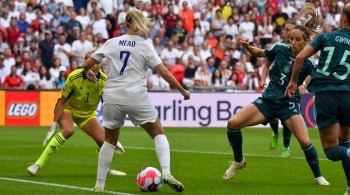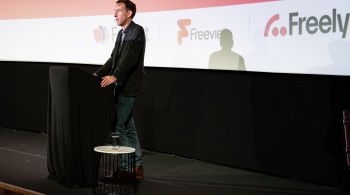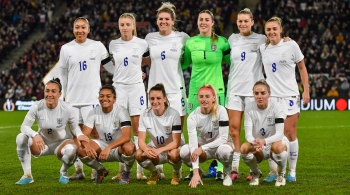While I would not dispute that this is probably the most extraordinary “Edinburgh” of the festival’s 45-year history, it was always going to be a special one, CoVid or NoVid.
This Edinburgh is, and always was, going to be held in the shadow of two enormous and profound trends in our industry and our wider culture.
David Olusoga will enlighten the Edinburgh audience with the historical significance of how we portray the experience of every British person. Throughout the programme of events which Freeview is privileged to support, the importance of fair representation will be paramount.
The other great trend of course is about the very nature of the industry in which David, I and you all work and the profound changes that it faces – in content production, in distribution and in consumer choice.
Change or get out of the way
The New York Times last week reminded us of the change that has come to Hollywood, how the universe of streaming had rewritten the script for the great studios. “Change or get out of the way”, seems to be the message as very senior people have paid the price with their jobs for failing to adapt to the new doctrines of the SVoD world. The economics and hard-headed management style of streaming is replacing the old-fashioned and relatively genteel environment of Tinseltown.
And you can now hear that change coming down our road. I heard the other day that someone familiar with the mindset of the new content giants of Silicon Valley said that they regarded the public-service broadcasters of Britain, and indeed the rest of Europe, as “roadkill” on their highway to global distribution. I think the message from the New York Times piece is not as bleak as that, but it is undoubtedly the case that if we don’t adapt to a future where streaming and subscription play a dominant role in our world, British television could become little more than a delicate little cultural hedgehog tootling along the slow lane.
Yet I think there are many reasons to believe that we will survive the arrival of this new world in better shape than others. Because every time we drive or take the train or fly in to Edinburgh (or as today we invite it onto the screens in our temporary workspaces), it is the extraordinary invention and resilience of the British television industry that always strikes us. This is a thriving industry, a vibrant, flourishing example of the wit and invention of a people who have always done better than expected in marketplaces around the globe.
We are not a footnote in the story of the media, we are its contents-page. We are the index of what can be done in the medium of broadcasting.
But the difference between us and those juggernauts thundering up behind us is scale. We cannot, especially as individual producers, or broadcasters or even platforms, stand up to organisations who demand uniformity from a position of universality. I don’t think there is a single national broadcasting infrastructure in the world, maybe not even in the US itself, which is strong enough to resist the globalising impulses of Silicon Valley.
National distinctions vs transnational competition
What these new entrants to the market offer is great for consumers and in the short-term at least, great for the production industry in this country. I’m not suggesting that what is offered by these companies, the biggest, richest and arguably the most influential in world history, is without value. Netflix has taken both strategic and creative risks and should be applauded for its ambition. Yet one has to consider the consequence for national distinctions of any given industry in the face of the Silicon Valley approach to planetary dominance.
I find it interesting that US companies, including those based in Silicon Valley, usually refer to “territories” or “markets” rather than “nations” or “countries”. Maybe that is a warning sign to industries such as ours that the competitive struggle is on a transnational footing.
And if that is so, then it must also be true that it is not the place for individual companies or even whole sectors to be engaging with them alone. That’s the whole point: what we have all built here is something of immense, unprecedented and irreplaceable value, so much so that it needs new thinking from everyone involved, from the top to bottom of Britain, on how to armour-plate it to compete in this changing world.
Cultural sovereignty
For a start, we should be looking for assistance and guidance from our regulators and our government. Clearly, there is no “national security” element to the commissioning of television content, but might there not be an element of what Mark Thompson, shortly after last year’s Edinburgh, called “cultural sovereignty”?
So I would say the other big question facing us this year is what we need from our government and from Ofcom – as well as from ourselves and from each other – to make the best strategic moves to preserve the unique, independent and world-beating character of our television industry. Because make no mistake, we need Ofcom, we need DCMS, we need No.10 and we need the support of Parliament to help us in the months and years ahead.
Let’s have a clear statement of belief from Ofcom that television is a vital part of our identity as a nation – more accurately as a collection of nations – as well as a vital part of our international status and our economic future.
We need our politicians to make clear by deeds as well as words that they know this is a special manufacturing sector - which in itself is a concept in short supply in pre-Brexit Britain - and one that allows the UK greater soft power than any other.
Finally, we need each other so that we have the confidence that we are something different in the realm of British culture and business: something that creates jobs, that promotes the nature of what it means to have a stake in this society wherever or however you are born, that unites rather than divides. We need the intellectual and emotional investment of our British competitors and collaborators behind us too, because the real competition is coming from elsewhere.
Let’s face a big new world, where we reflect the society that we serve, with a new commitment to let British creativity flourish, to embrace the whole spectrum of our audience and let the world know that over here, we own the fast lane.



